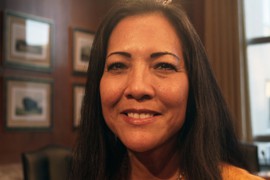Cronkite News has moved to a new home at cronkitenews.azpbs.org. Use this site to search archives from 2011 to May 2015. You can search the new site for current stories.
Native Americans testify on need to preserve identity in face of popular culture
WASHINGTON – When nonnative people don war bonnets at Halloween or Thanksgiving, when they give their sports teams names like Redskins, they may argue that they are simply paying homage to Native Americans.
Mary Kim Titla doesn’t see it that way.
“That’s offensive to us,” said Titla, a member of the San Carlos Apache tribe in Arizona, who testified to a Senate committee in Washington Thursday.
“The reality is that if we, as native people, don’t feel good about what we see, then something is wrong (with it),” Titla said.
She was one of six witnesses testifying before the Senate Indian Affairs Committee about how Native Americans can reclaim their image and identity in society.
The hearing comes against a backdrop of recent high-profile incidents in which Native American groups have been angered by the portrayal of their cultures in the popular media.
The Navajo Nation sued Urban Outfitters Inc. earlier this year for using “Navajo” to market some of its products, such as T-shirts, jackets, purses, bracelets and underwear.
This month, Victoria’s Secret was criticized for sending a model down the runway of its annual fashion show wearing a feathered headdress and a loincloth-inspired outfit. The company has since apologized.
Sen. Daniel Akaka, D-Hawaii, said those kinds of images need to be mitigated to reclaim American Indian and Alaska Native identity for future generations.
Witnesses told the committee the struggle for their Native American identity is often internal as well as societal.
Andrew Lee, an executive at Aetna Inc. and a trustee at the National Museum of the American Indian, said he spent years trying to get comfortable with his half-Seneca identity. He had not mentioned his heritage when, early in his career, he met a man who said he thought they “got it right in South America by wiping out the indigenous population.”
Lee said he went out of his way to befriend the man, revealing his ancestry only months later. He said the man eventually became an ally, which taught Lee that people need to “build bridges of understanding” whenever possible.
Former Miss Indian World Marjorie Linne Tungwenuk Tahbone said in her prepared testimony that she struggled with her dual native heritage – she is “split between Inupiaq and Kiowa.” But she got no help from popular media when she looked to it to “teach me how to be an Indian.”
“I had seen ‘Pocahontas,’ ‘Dances with Wolves,’ Bugs Bunny with Indians, and I took those as accurate portrayals of Indian people,” her statement said. “I had unknowingly created a false identity of myself.”
Titla, a communications officer for the San Carlos Unified School District, said schools should hire more native teachers to help American Indian students learn their languages and retain traditional practices.
“Our children do not know or comprehend what it means to be Native American in a modern age,” she testified.
Panelists said that Congress should continue to support Indian Country on issues such as education, tribal self-determination and self-governance to ensure that Native Americans can protect their cultures.
After her testimony, Titla lauded a recent Arizona Department of Education move to offer Native American language certification in an effort to bring native language speakers into schools.
“That was a long time coming,” she said.
Still, she said more needs to be done to help native students retain their identity. She said that when native schools fail to reach state-issued benchmarks, the “failing” label can have a negative effect on students and give the impression that the whole community is a failure, even though there are success stories.
“We have many of those stories and it’s important to look at all the great things we do as a whole rather than focusing on where we fall short,” she said.







